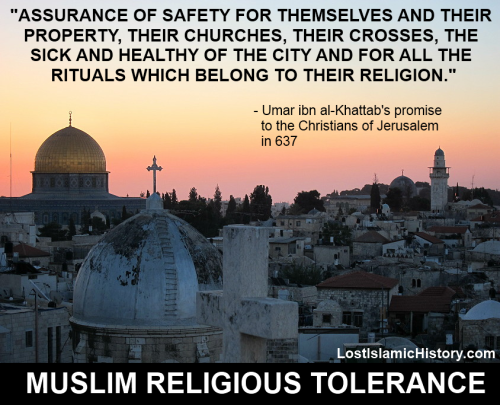
By Craig Considine
Today's far-right parties in Europe, such as the National Front in France and the Party for Freedom in Holland, are surging in popularity and calling for legal bans on veils, mosques, minarets, sha'ria, and even the outright expulsion of Muslims from the continent. In short, the far-right perceives Muslims as "inassimilable" and their religion as "evil" and "backward."
Ironically, however, Muslims have a rich history of harmony, justice, and compassion for humanity. These historical facts raise the question of whether Europe's far-right parties should look to Muslim history for direction and guidance in their approach to handling minority communities.
Prophet Muhammad set the precedent for Muslims in regards to tolerance in the Constitution of Medina, one of history's first legal documents to safeguard human rights. Also called the Medina Charter, Prophet Muhammad's Constitution provided equal rights to non-Muslims living under an Islamic government around the year 622. According to the Constitution, "Strangers" in Muhammad's Muslim society were to be treated with special consideration and "on the same ground as [Muslims]."
Six years after creating the Medina Constitution, Muhammad sent a letter to Christian monks at St. Catherine's in the Sinai, Egypt, to show his desire to protect vulnerable religious communities. In the letter, Muhammad offered the Christians peace and called on his fellow Muslims to "defend [Christians], because Christians are my citizens."
Muhammad's letter to the Christian monks also includes advice on how Christian judges are not to be removed from their offices, nor are the monks to be forced out of their monasteries. "No one is to destroy a house of their religion," Muhammad stated, "or to carry anything from it to the Muslims' houses." He added: "Their churches are to be respected. They are neither to be prevented from repairing them nor the sacredness of their covenants."
On Mount Arafat in 632 AD, Muhammad left another "charter" for human rights. In his "Final Sermon," he claimed that "an Arab has no superiority over a non-Arab, nor a non-Arab has any superiority over an Arab... a white person has no superiority over black nor does a black have any superiority over white except by piety and good action." The Final Sermon shows how Muhammad had great care for all people, regardless of their ethnic composition, and that diversity should be celebrated instead of eradicated from society.
Other Muslims leaders, such as Caliph Umar, advised his predecessors "to treat ahl al-dhimmah (Jews and Christians) well, to defend them against their enemies and not burden them with more than they can bear."
Umar also stated: "Treat all people as equal... I advise you not to let yourself or anyone else do wrong to ahl al-dhimmah." Umar was following in Muhammad's footsteps in treating Jews and Christians as equal to Muslims.
Abu Bakr, one of Muhammad's trusted advisors, is also on record stating that "the most important foundation of a truly Muslim country is justice and equality for all. In fact, a country that is bereft of justice and equality, though it may be inhabited by Muslims, is not really a Muslim country at all."
Another Muslim leader, Akbar the Great of the Mughal Empire, would echo Muhammad, Umar, and Abu Bakr's message of tolerance and harmony centuries later. Upon assuming power, Akbar ended the jizya, or poll tax, on non-Muslims and invited people of all religious backgrounds to his court to engage in interfaith dialogue.
Moreover, Akbar had tremendous respect for Christianity, visible in the Buland Darwaze, a large gate-structure at the city of Fatehpur Sikri, on which he had transcribed the Qur'anic inscription: "Isa [Jesus], son of Mary, said: This world is a bridge. Pass over it, but build no houses on it. He who hopes for an hour may hope for eternity. The world endures but an hour. Spend it in prayer, for the rest is unseen."
Rumi, the famous Sufi poet of the 13th century, also revered Jesus and extended his hand in friendship to non-Muslims. Rumi's most powerful words echo love and peace to all regardless of ethnic background:
I am neither Christian, nor Jewish, nor Muslim I am not of the east, nor of the west... I have put duality away, I have see the two worlds as one; One I seek, One I know, One I see, One I call (Divan-i Sham-i Tabriz, II)
Members of Europe's far-right parties can look to these great Muslim leaders for guidance in how to treat Muslims in their societies. However, Europeans today can also look to the example on their continent - Muslim Spain, between the 8th and 15th centuries - when Muslims ruled a diverse society of Jews and Christians in a relative state of harmony, which was utterly unthinkable in other Christian European cities such as London or Paris.
Muslim Spain reached a state of tolerance which has its very own name - convívencía - which can literally be translated as "living with-ness," or "requiring tolerance."
Perhaps its time for Europeans to adopt a 21st century style convívencía so they can come to grips with what Muslims and Islam can offer to European society.




No comments:
Post a Comment